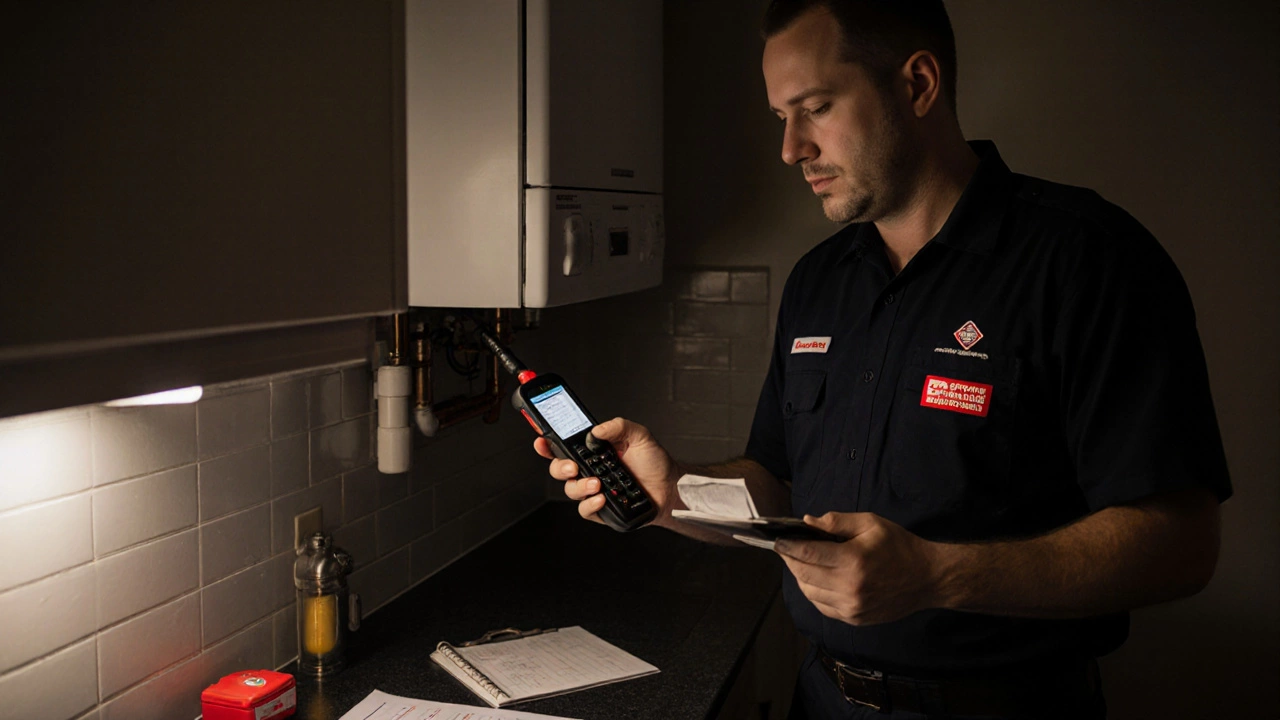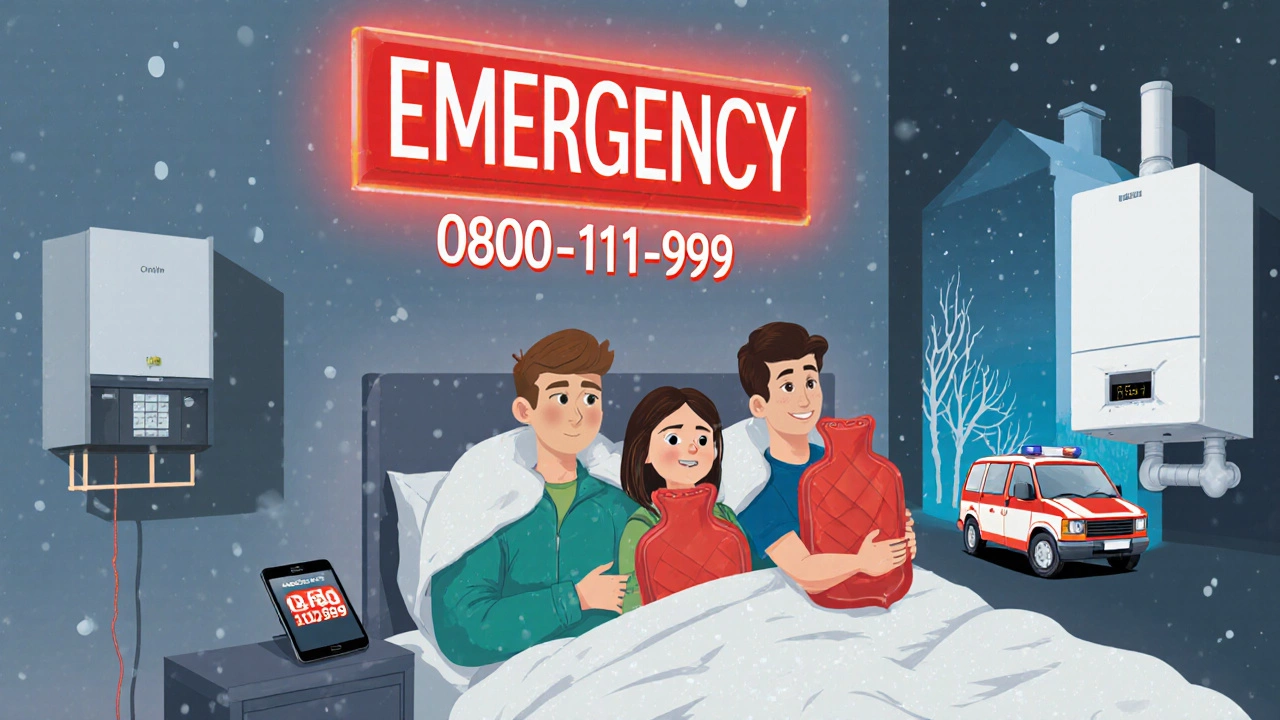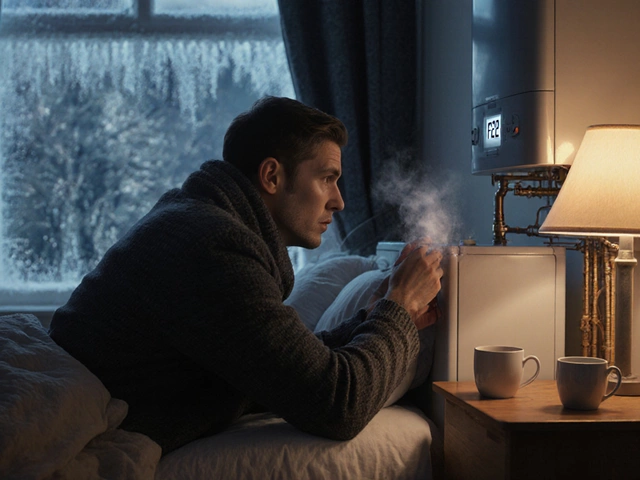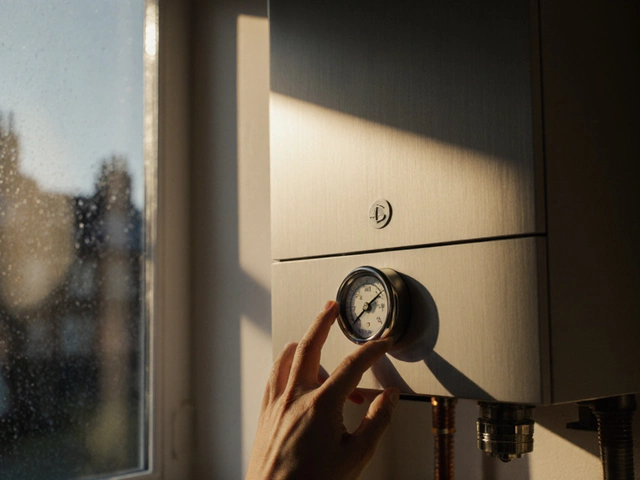Emergency Boiler Situation Checker
Check your situation
Answer these questions to determine if you need emergency assistance.
Answer the questions above to get your emergency status.
If your boiler suddenly stops working, you’re not just cold-you’re stressed, maybe even panicked. It’s October 28, 2025, and the nights are getting longer. Your radiators are icy. The hot water’s gone. And you’ve got kids, pets, or just plain old human needs that demand warmth and clean water. So who do you actually call? And what do you do before you call them?
First, check the basics-don’t panic yet
Before you dial anyone, take two minutes. A surprising number of boiler failures are simple fixes. Check the thermostat. Is it set above 18°C? Is it on? Sometimes it’s been switched off by accident during a move or a child playing with it.Look at the boiler’s display. If it shows an error code like E1, F22, or EA, write it down. These codes mean something specific. For example, F22 usually means low water pressure. You might be able to fix that yourself by repressurising the system using the filling loop-usually a small silver lever or knob near the bottom of the boiler. Turn it slowly until the pressure hits 1.2 to 1.5 bar. Then close it. Done.
Check your fuse box. Has the boiler’s circuit tripped? Reset it. Is your smart thermostat connected to Wi-Fi? Sometimes it’s just a signal issue. Restart the app. Try turning the boiler on manually at the unit itself, not through the app.
If none of that works, you’re not imagining it. Your boiler has failed. Now it’s time to call someone.
Call a Gas Safe registered engineer-no exceptions
In the UK, only a Gas Safe registered engineer is legally allowed to work on gas boilers. This isn’t a suggestion. It’s the law. Unqualified people can cause gas leaks, carbon monoxide poisoning, or even explosions. Don’t risk it.Gas Safe is the official register. Every qualified engineer has a unique ID number printed on their badge. Ask to see it. You can also verify them online at www.gassaferegister.co.uk by typing in their name or company. If they can’t show you a valid card, walk away.
Don’t fall for the guy who knocks on your door offering a “quick fix.” He’s not registered. Don’t trust the ad on Facebook Marketplace that says “Boiler Repair £50.” That’s not a deal-it’s a danger.
Emergency or non-emergency? Know the difference
Not every boiler failure needs a 24/7 response. But some do.Call an emergency boiler service if:
- You smell gas (like rotten eggs)
- You feel dizzy, nauseous, or tired with no clear cause (possible carbon monoxide)
- Your boiler is leaking water and flooding your home
- You have no heating or hot water in freezing weather
If it’s just no hot water but the radiators are still warm, it’s probably a pump or diverter valve issue. That’s urgent but not life-threatening. You can usually wait until morning.
If you smell gas, leave your home immediately. Don’t turn lights on or off. Don’t use your phone inside. Go outside and call the National Gas Emergency Service on 0800 111 999. They’ll send someone out within the hour, no matter the time.

How to find a reliable boiler engineer fast
You need someone who shows up, fixes the problem, and doesn’t upsell you a new boiler you don’t need. Here’s how to find them:- Use the Gas Safe website’s “Find an Engineer” tool. Filter by your postcode and emergency service availability.
- Check Trustpilot or Google Reviews. Look for recent reviews-especially ones that mention response time and honesty.
- Ask neighbours. If someone in your street had their boiler fixed last winter, ask who they used. Word of mouth still beats ads.
- Call local heating companies that have been around for 10+ years. They’ve seen every boiler model made since 2000.
Avoid companies that only answer with automated voice systems. If you can’t speak to a real person within two rings, they’re probably outsourced and won’t care about your boiler.
What to expect when they arrive
A good engineer will:- Bring a diagnostic tool to read error codes
- Check for gas leaks and carbon monoxide with a meter
- Explain what’s wrong in plain English-not jargon
- Show you the part that failed
- Give you a written quote before starting work
If they say “I need to replace the whole boiler,” ask why. Is it because it’s 15 years old? Or because they want to make a bigger profit? Most boilers last 10-15 years. If yours is under 10 and only has one broken part, repair is almost always cheaper.
Ask if they offer a guarantee on parts and labour. Reputable companies give at least 12 months. If they don’t, walk away.
Costs you might face
Emergency boiler repairs in the UK usually cost between £150 and £400. That includes call-out fee, labour, and one part. Common repairs:- Pressure sensor replacement: £120-£180
- Thermostat or control board: £150-£250
- Heat exchanger leak: £300-£500 (often not worth fixing if boiler is old)
- Pump failure: £180-£300
Emergency call-outs after 6 PM, on weekends, or holidays can add £50-£100. That’s normal. But if a company charges £200 just to show up, that’s excessive.
Some energy suppliers offer boiler cover. If you have it, call them first. They’ll send their own engineer, and you pay nothing beyond the monthly fee. Check your policy documents.

What to do while you wait
While you’re waiting for help:- Turn off the boiler at the main switch. Don’t just turn it off with the thermostat.
- Open windows slightly if you suspect carbon monoxide-even a little airflow helps.
- Use electric heaters or hot water bottles to stay warm. Avoid open flames like gas lamps or barbecues indoors.
- Fill up kettles and jugs with hot water from the tap before it goes cold. You’ll need it for washing and drinking.
Keep a list of emergency contacts on your fridge: your boiler engineer, the Gas Safe helpline, and your energy supplier’s number. Don’t wait until you’re freezing to look them up.
Prevent this from happening again
A boiler breakdown isn’t always random. Most fail because they weren’t maintained.- Get your boiler serviced every year-by a Gas Safe engineer. It costs £80-£120, but it prevents 80% of breakdowns.
- Check your boiler pressure monthly. If it drops below 1 bar, repressurise it.
- Flush your system every 5 years. Sludge buildup kills pumps and heat exchangers.
- Install a carbon monoxide alarm. They cost £20 and can save your life.
Boilers don’t just die. They scream before they do. Listen. A banging noise? That’s air in the system. A gurgling sound? Could be low pressure. A weird smell? Don’t ignore it. Catching small problems early saves hundreds-and keeps you safe.
What should I do if my boiler has no power at all?
First, check your fuse box. The boiler may be on its own circuit. If the switch is off, turn it back on. If it trips again, don’t keep resetting it-there’s a fault. Next, check if the boiler’s plug is loose or if the power cable is damaged. If everything looks fine, call a Gas Safe engineer. A power failure could mean a blown control board or a faulty ignition system.
Can I fix my boiler myself?
You can repressurise the system, reset the boiler, or check the thermostat. That’s it. Anything involving gas pipes, internal components, or electrical wiring must be done by a Gas Safe engineer. Even small mistakes can cause gas leaks or carbon monoxide buildup. DIY fixes on boilers are dangerous and illegal in the UK.
How long does a boiler repair usually take?
Simple repairs like replacing a pressure sensor or resetting the control board take 1-2 hours. More complex jobs like fixing a heat exchanger or replacing a pump can take 3-5 hours. Emergency call-outs often take longer because engineers need to travel. If it’s taking more than half a day, ask why. You should be getting updates.
Is it better to repair or replace my boiler?
If your boiler is under 10 years old and the repair cost is less than half the price of a new one, repair it. If it’s over 12 years old, needs frequent repairs, or has a cracked heat exchanger, replacement is usually smarter. New boilers are 30-40% more efficient. You’ll save on bills and avoid future breakdowns.
What if my boiler is under warranty?
Call the manufacturer or the installer first. Most warranties require annual servicing to stay valid. If you’ve had it serviced, they’ll fix it for free. If not, they might charge you for the call-out. Keep your service records. They’re your proof.




